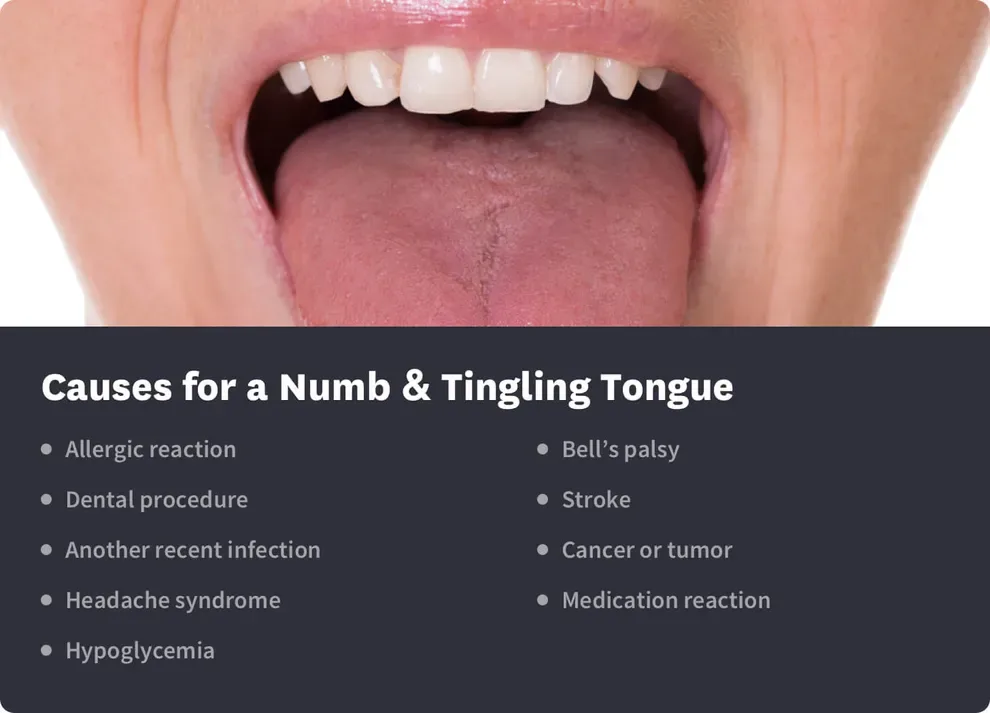Reasons for Numb or Tingling Tongue: Symptoms & Treatment

Table of Contents
- Causes
- When to Be Concerned
- Serious Symptoms
- Treatment Options
- Suspecting a Serious Problem
- References
Common causes of a numb or tingling tongue include allergic reactions, stroke, low blood sugar, multiple sclerosis, dental procedures, and nerve damage.
Some of these conditions can quickly become life-threatening. If you experience signs of a stroke or a serious allergic reaction, seek immediate medical help.
Less serious causes of a numb or tingling tongue can often be managed at home by paying closer attention to environmental and dietary aspects. If a numb or tingling tongue persists or is accompanied by other symptoms, talk to a medical or dental professional.
The feeling of “pins and needles,” numbness or tingling in your tongue, is also called paresthesia. This feeling can be transient and temporary, meaning that it comes and goes, or it can set in and stick around. It can also be the sign of a serious problem that requires immediate medical attention.

Causes for a Numb and Tingling Tongue
Numbness or tingling in the tongue is often related to pressure or damage to nerves that can cause a loss of sensation. This can be a minor and temporary sensation, or the sign of a much bigger and more serious reason.
Here are some common causes of a tingling or numb tongue:
Allergic reactions involving tongue numbness and tingling are typically mild and called oral allergy syndrome. Most people with this develop food sensitivities to vegetables and fruits that can cause the tongue to feel tingly and numb as a result of cross-reactivity involving an allergy to pollen.
Oral allergy syndrome can come on later in life even to foods that were never an issue before.
Dental procedures often involve medications and anesthetics to numb the tongue or nerves impacting the mouth. This sensation typically wears off in a day or two.
The lingual nerve can be damaged during a dental procedure, which can prolong the numb and tingling feeling for a few weeks or months. However, most of the time, these feelings are temporary and wear off in time.
One of the most common symptoms of the central nervous system disease multiple sclerosis, or MS, is numbness, and this can extend to the tongue. An MS flare-up that causes numbness will usually go away on its own. These flare-ups can come and go.
A rare disorder called neck-tongue syndrome can cause pain in the neck and a tingling sensation in half of the tongue, often as a result of a cervical spine disorder. It has been shown to appear after whiplash, and it is a form of a headache syndrome. The pain and sensations on the tongue can come on suddenly, and episodes are generally short-lived.
Low blood sugar, called hypoglycemia, can also cause tingling or numbness in the face or mouth, including the tongue. This happens when your blood glucose levels drop below a healthy range, and it is a common side effect of diabetes. The numbness and tingling usually go away when you get your blood sugar back up to healthy ranges.
This is a condition that comes on suddenly and involves facial weakness or paralysis, typically on one side of the head or face. It is often related to damage to the facial nerve.
It can happen to people of all ages, and it can include feelings of numbness and tingling in the tongue. These symptoms will generally start to ease within two weeks and go away almost completely within three months.
A TIA, or transient ischemic attack, is a “mini stroke” that causes reduced blood flow to the brain. This can be recognized by trouble speaking and numbness or tingling in your legs, arms, face, and tongue.
This can be the sign that a bigger more serious stroke is on its way. You need to seek immediate medical attention.
A tumor, that can be either cancerous or not, can put pressure on the nerves of your face and those that serve your tongue, which can lead to numbness and tingling sensations. This can actually be an indicator that something deeper is going on and needs to be addressed.
Some medications have side effects that can include a tingling sensation in your mouth or on your tongue. Tongue numbness or tingling can also be related to an allergic reaction to a medication. If you are experiencing these symptoms, talk to your doctor.
When to Be Concerned
If the tingling or numbness in your tongue does not go away after a few days or weeks, check with your doctor or dentist to find out why, especially if there is no known reason for this to be happening.
If the numbness or tingling moves to other parts of your face, or you have other symptoms, seek medical advice. With a dental procedure, the numbness can sometimes persist for a few months, but it is still important to discuss with your dentist.
A stroke requires swift medical intervention to restore blood flow to the brain. The faster emergency treatment is administered, the better. Sudden numbness or tingling of the tongue can be the sign that a stroke is imminent, and this is a medical emergency.
An anaphylactic allergic reaction can also be a life-threatening emergency that requires immediate medical attention.
Common vitamin and mineral deficiencies that can cause tingling in your mouth include lack of iron, zinc, B vitamins (especially B12), calcium, and phosphorus.
Serious Symptoms to Watch Out For
It is important to recognize signs of a stroke and a possible anaphylactic reaction, both of which require immediate medical attention to prevent further damage and potentially be lifesaving.
These are signs of a stroke:
Sudden paralysis of one side of the face, leg, or arm
Balance and coordination issues
Slurred speech
Sudden and severe headache
Vision problems
Dizziness, weakness, or numbness
These are signs of anaphylaxis:
Hives
Respiratory distress
Swelling, tingling, or numbness in the tongue
Confusion
Lightheadedness or rapid heart rate
Treatment Options for Minor Causes
Depending on what is causing your numb or tingling tongue, and if it is a symptom of a bigger issue that needs specific medical attention, there are some things you can do to help it.
For example, if you notice tingling or numbing of your tongue after eating certain foods, especially if you are allergic to pollen, avoid eating those fruits and vegetables raw. Cooking them, or even peeling them, can often reduce the reaction. Oral antihistamine medications can help too.
If your numb and tingling tongue is caused by low blood sugar, you can keep this from happening by managing your blood sugar levels and ensuring they do not drop so low. If your blood sugar does drop too low, drink some fruit juice or eat a fast-acting carbohydrate to bring it back up quickly.
When your tongue is tingly or numb as the result of an underlying condition, talk to your doctor. They can help you treat the root cause to help with your numb or tingling tongue symptoms.
What To Do If You Suspect a Serious Problem
A mild and temporary case of tongue numbness or tingling may be no cause for worry. It could be caused by a food sensitivity, pollen reaction, medication side effect, or recent dental procedure.
If your tongue problem is accompanied by other symptoms, however, or if it keeps coming back (or doesn’t go away for days or weeks), you may be dealing with a more serious issue that requires medical attention or possibly even emergency medical care.
Possible Anaphylaxis or Stroke: Seek Emergency Help
If your tongue numbness occurs after eating or coming into contact with something you may be allergic to, and you’re experiencing other extreme reactions (including trouble breathing, swelling, hives, or a rapid heartbeat), seek immediate emergency medical care. You may be experiencing anaphylaxis, a dangerous and life-threatening allergic reaction.
If your tongue tingling problem occurs along with other symptoms of a stroke or “mini-stroke” (transient ischemic attack), including paralysis on one side of the body, vision problems, dizziness, or slurred speech, seek immediate emergency medical care. You may be experiencing a stroke, which can result in brain damage, disability, and even death.
If you suspect you’re experiencing anaphylaxis or a stroke, but aren’t sure: still seek immediate emergency medical care. If there is even a chance that you are, early care can make a huge difference in the outcome and even save your life. Every moment counts.
Other Underlying Conditions: Speak to your Doctor or a Medical Professional
If you’re not having an emergency health crisis relating to your tongue numbness, but the problem is recurring and/or accompanied by other problematic symptoms, speak to your doctor about potential underlying issues that could be causing it.
Other problematic symptoms may include the following:
Nerve pain, numbness, or tingling in other parts of the body (may be related to multiple sclerosis, Bell’s palsy, a tumor, or cancer)
Headaches (may be related to a headache disorder)
Sweating, dizziness, and hunger (may be related to hypoglycemia or diabetes)
The underlying conditions that may be causing your recurring or serious tongue numbing issue may be serious. Don’t delay in meeting with a medical professional to address the issue and find the root cause. Early intervention may help you to treat the problem more effectively and quickly.
Mild but Recurring Tongue Numbness or Tingling: Consult your Doctor
If your tongue numbing problem is mild but keeps coming back, it’s time to ask a medical professional for help. Even if the issue is only due to a food you’re eating or medication you’re taking, your doctor may be able to help relieve these symptoms.
Food sensitivity tests may help you to uncover the source of the reaction. If it’s due to a medication, they may be able to help adjust your medication protocol to correct the issue.
Even if your tongue numbness or tingling seems mild, if it’s recurring, it may be a sign of an underlying issue. Meeting with your doctor to explain your symptoms can help ensure any problems are caught as early as possible.
